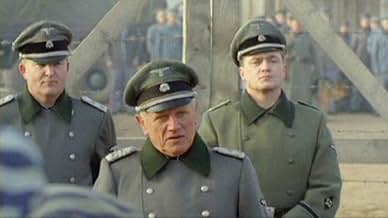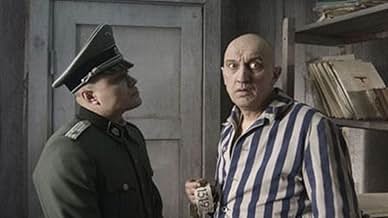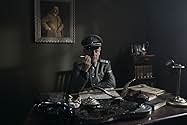Dievu miskas
- 2005
- 2h
IMDb RATING
7.7/10
1.9K
YOUR RATING
A man who was imprisoned by the Nazis later writes of his experience, then he is imprisoned by the Soviets, just as oppressive as the Germans.A man who was imprisoned by the Nazis later writes of his experience, then he is imprisoned by the Soviets, just as oppressive as the Germans.A man who was imprisoned by the Nazis later writes of his experience, then he is imprisoned by the Soviets, just as oppressive as the Germans.
- Director
- Writers
- Stars
Liubomiras Laucevicius
- Wacek Kazlowski
- (as Liubomiras Lauciavicius)
Diana Aneviciute
- Professor's wife
- (as Diana Valiusaitiene Aneviciute)
- Director
- Writers
- All cast & crew
- Production, box office & more at IMDbPro
Featured reviews
10kasyrabl
Hello everybody, I'm from Lithuania, the country where this movie was made :) Although I haven't seen it yet, I've read the book, which the movie is based on, "Balys Sruoga - Dievu Miskas" (Forest of the Gods) several times and the least I can say is that it's absolutely wonderful, capturing the cruelties of the concentration camp with subtle black humour and irony. Especially when describing the main "bad guys" (gards, authority of the camp). As you may know the book which the movie is based on is an autobiography of the author Balys Sruoga, he suffered in this camp and survived, then wrote a book. Not sure how good the movie is, but judging from the book it should be a masterpiece. Obviously, this movie should be viewed in original Lithuanian language for maximum effect, because sometimes, well most of the time, the subtitles are somewhat terrible. That'll be all,sorry for mistakes if any :)
This film is based on a slightly fictionised autobiography and reflects it very well. It's very sad and haunting film, with many interpretational elements. Some scenes are very artistic too. It's a very good arty film.
One of the greatest directors of Lithuanian cinema - Algimantas Puipa. One of the greatest novels - "The Forest of Gods" by Lithuanian writer Balys Sruoga. One of the worst screenings ever.
A true story about a professor who struggled with the inhumanity of Nazi in one of their death camps (Stuthof). Irony was the only weapon he had. "I laugh a lot during hard moments. I am deeply ironic - not to the people I'm going to die with, but to the whole wide world." - wrote Balys Sruoga in a letter to his wife from Stuthof death camp in 1944. The novel is a masterpiece, however, the movie - far from it: unnatural dialogs, forced acting.
A true story about a professor who struggled with the inhumanity of Nazi in one of their death camps (Stuthof). Irony was the only weapon he had. "I laugh a lot during hard moments. I am deeply ironic - not to the people I'm going to die with, but to the whole wide world." - wrote Balys Sruoga in a letter to his wife from Stuthof death camp in 1944. The novel is a masterpiece, however, the movie - far from it: unnatural dialogs, forced acting.
10njumeil
First thing: this movie "based on the novel". BASED on the novel. So all those, that downrate it, because the movie does not follow beloved book, should start to learn separating one media from another.
There are no synthesized emotions in this. Everything feels real, or at least as real as the emotions in the diary of someone that is waiting for his days to end in concentration camp.
The main advantage of Puipa's masterpiece is this: There is no prejudice, no-goodie-white-hoodie and no evil-bad-wolf-hanibal-lector type characters. Everyone is show as a human. You will not feel sympathy for guards or collaborators, but you will understand things like "why do such people rise in times like this" or even start thinking about reasons that could turn good people into animals. Director won't tell you what to feel! It's such a rare feature, that it is hard to understand this concept at first.
There is some black humor in this movie too. It's dark, noir even, although it's so true, that it feels close even if you can't connect to WWII in any way.
Subtle details, real-life philosophy, humour, rich characters, absolutely stunning camera work makes this movie one of the best. It's not a fairy tale as Shindler's list is: you wont feel guilty if you are not crying in the end and everyone will understand why are you weeping if you do.
There are no synthesized emotions in this. Everything feels real, or at least as real as the emotions in the diary of someone that is waiting for his days to end in concentration camp.
The main advantage of Puipa's masterpiece is this: There is no prejudice, no-goodie-white-hoodie and no evil-bad-wolf-hanibal-lector type characters. Everyone is show as a human. You will not feel sympathy for guards or collaborators, but you will understand things like "why do such people rise in times like this" or even start thinking about reasons that could turn good people into animals. Director won't tell you what to feel! It's such a rare feature, that it is hard to understand this concept at first.
There is some black humor in this movie too. It's dark, noir even, although it's so true, that it feels close even if you can't connect to WWII in any way.
Subtle details, real-life philosophy, humour, rich characters, absolutely stunning camera work makes this movie one of the best. It's not a fairy tale as Shindler's list is: you wont feel guilty if you are not crying in the end and everyone will understand why are you weeping if you do.
The main problem with this film is the plodding pace. It's just so slow and long! For a war film, that's hard to accept. The historical context is interesting but this film did not do it as much justice as it deserves. There are moments that propel the plot and kept my interest but overall I would say this is a better sleeping aid than a film.
Details
- Release date
- Countries of origin
- Official site
- Language
- Also known as
- Forest of the Gods
- Filming locations
- Production companies
- See more company credits at IMDbPro
Box office
- Budget
- €1,700,000 (estimated)
- Runtime2 hours
- Color
- Sound mix
- Aspect ratio
- 1.85 : 1
Contribute to this page
Suggest an edit or add missing content




















